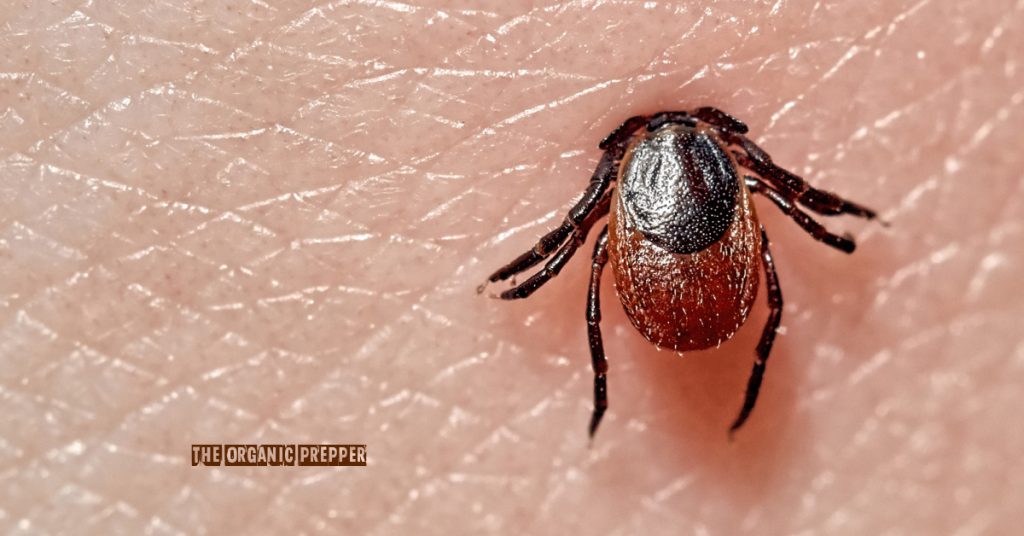by Daisy Luther, The Organic Prepper:

Dairy and red meat allergies may now be the 10th most common food allergies in the U.S., according to CDC estimates. In case you haven’t heard, alpha-Gal syndrome is on the rise, and it’s still largely unrecognized.
What is this new syndrome? Who needs to avoid red meat and dairy? Might something else be going on here? Let’s look a little deeper at how a simple tick bite can have lifelong, devastating effects – and not just from Lyme Disease.
TRUTH LIVES on at https://sgtreport.tv/
What is alpha-Gal syndrome?
Alpha-Gal syndrome begins with a bite from an infected tick or chigger. The tick or chigger bites some kind of mammal and ingests its blood, which contains alpha-Gal, a type of sugar molecule. If that tick or chigger goes on to bite a human, it can transmit some of the alpha-Gal-tainted blood to the human, which may then trigger an allergic reaction to red meat or dairy products.
One of the stranger things about alpha-Gal syndrome is the time in which it takes for symptoms to present themselves. It typically takes a few months after the tick bite for the person’s antibodies to alpha-Gal to build up, and then it is often several hours after a person eats meat that they have their allergic reaction. (source) The time delay makes diagnosis really difficult because victims often feel like their allergic reactions appear out of nowhere. Before people knew what to look for, an alpha-Gal syndrome diagnosis took some sleuthing.
Alpha-Gal is something to be aware of, particularly since it can be triggered not only by meat and dairy but also drugs containing mammal products, and even carrageenan, an Irish moss used as a food thickener. If you’ve got allergic reactions you can’t explain, you could ask your doctor about getting a blood test to rule this out.
However, for those of us familiar with all our allergies, this is not something to lose sleep over.
In fact, overdiagnosis of alpha-Gal syndrome may be a bigger concern. Detailed studies have shown that about a third of the American population has antibodies to alpha-Gal, which means they’ve already encountered it somewhere. And yet the overwhelming majority of us can eat red meat without ill effects.
So, why the hype around this relatively obscure medical condition?
Well, part of it is simply that sensation sells. The public is fascinated by weird medical conditions, and exotic diseases make for good clickbait.
But we can’t ignore that this is another convenient excuse to scare people away from real meat. Most of us have been happily ignoring the medical establishment’s insistence that red meat is bad for us for years. PETA’s been trying to get us away from eating meat because of animal cruelty. The WEF wants us to avoid eating meat because of climate change. And now the powers are aligning to make us afraid of it due to potential allergic reactions.
Lest you think this is farfetched, take a look at this speech by S. Matthew Liao, the philosopher and bioethicist who endorses human engineering to solve climate change. He thinks that most people are too weak-willed to give up eating meat for the sake of climate change, which is what really needs to happen. So he specifically cites inducing meat allergies as something beneficial for the planet.
Research into using ticks to induce disease has been going on for a long time. There is a lot of speculation that Lyme disease is something that blew off the Plum Island Animal Research Center. This is still treated as a conspiracy theory. However, Lyme disease was first diagnosed about ten miles from Plum Island, and there are published research papers regarding projects involving the use of ticks to spread various diseases being conducted there It doesn’t seem like much of a stretch to me, but maybe I’m just overly cynical.
It would be horrifying if we were to discover this was man-made.
Either way, there are so many things wrong with inducing allergies it’s hard to know where to begin. Allergic reactions range from uncomfortable to deadly. Deliberately inducing them would be a return to Nazi-era human experimentation.
There is also a real disconnect between the importance of meat to different cultures and the necessity of it in different environments. Local cuisines are much of what makes traveling fun. If we’re all supposed to eat locally, but we’re not supposed to eat meat, that necessarily precludes living in many of the earth’s colder regions. There’s a reason vegetarian societies developed in India, while Inuit cultures were historically carnivorous.
We shouldn’t be afraid of eating meat. Variety is truly the spice of life; enjoying food unique to your locale is one of life’s simple pleasures.
We also shouldn’t be afraid to go outdoors.
We should also not be afraid of going outdoors. I think the push to get rid of meat and make fake food acceptable is real. I also think there’s a real push to get people disconnected from nature and into fifteen-minute cities. Hyping a medical condition that makes people scared of meat and the outdoors checks both those boxes.
And yes, I know country people can laugh all this off. But this nation is full of people with little to no connection with nature, people who think every bug bite will make them sick. Unfortunately, this cohort of people is big enough to vote us in or out of those fifteen-minute cities.
And to these people living indoors and behind screens, I want to say: don’t be terrified of bugs. Don’t be stupid, but don’t be terrified, either. Blackbird recently published a fantastic article about parasite control. There are a lot of things you can do to minimize your chances of getting sick.
Read More @ TheOrganicPrepper.ca




